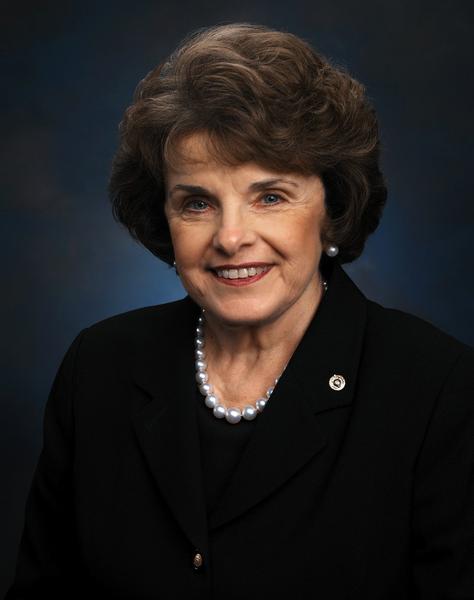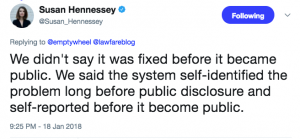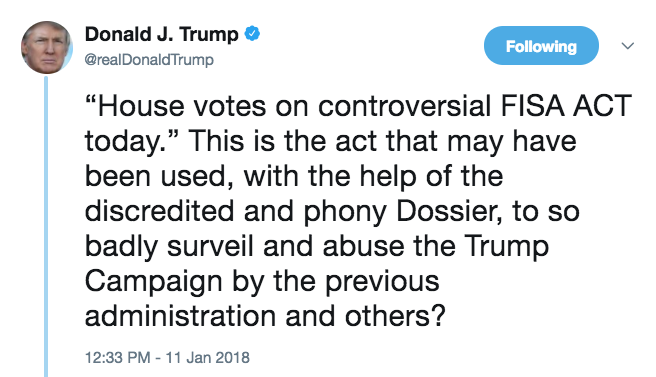On Disinformation and the Dossier
By all accounts, the House will vote to release the Nunes memo tonight, even while Adam Schiff pushes to release his countering memo at the same time. Perhaps in advance of that, Andrew McCabe either chose to or was told to take leave today until such time as his pension kicks in in mid-March, ending his FBI career.
Since we’re going to be obsessing about the dossier for the next while again, I want to return to a question I’ve repeatedly raised: the possibility that some or even much of the Christopher Steele dossier could be the product of Russian disinformation. Certainly, at least by the time Fusion and Steele were pitching the dossier to the press in September 2016, the Russians might have gotten wind of the project and started to feed Steele’s sources disinformation. But there’s at least some reason to believe it could have happened much sooner.
Former CIA officer Daniel Hoffman argues the near misses are a mark of Russian disinformation
A number of spooks had advanced this idea in brief comments in the past. Today, former CIA officer Daniel Hoffman makes the arguement at more length at WSJ.
There is a third possibility, namely that the dossier was part of a Russian espionage disinformation plot targeting both parties and America’s political process. This is what seems most likely to me, having spent much of my 30-year government career, including with the CIA, observing Soviet and then Russian intelligence operations. If there is one thing I have learned, it’s that Vladimir Putin continues in the Soviet tradition of using disinformation and espionage as foreign-policy tools.
Hoffman points to what I consider the dossier’s abundance of near-misses (such as events involving the correct person in the wrong place or time) on correct information to back his case.
The pattern of such Russian operations is to sprinkle false information, designed to degrade the enemy’s social and political infrastructure, among true statements that enhance the veracity of the overall report. In 2009 the FSB wanted to soil the reputation of a U.S. diplomat responsible for reporting on human rights. So it fabricated a video, in part using real surveillance footage of the diplomat, that purported to show him with a prostitute in Moscow.
Similarly, some of the information in the Steele dossier is true. Carter Page, a Trump campaign adviser, did travel to Moscow in the summer of 2016. But he insists that the secret meetings the dossier alleges never happened. This is exactly what you’d expect if the Kremlin followed its usual playbook: accurate basic facts provided as bait to convince Americans that the fake info is real.
John Sipher, in our joint interview with Jeremy Scahill admitted such a thing was possible, though that the dossier still tied the hack to “collusion.”
The Russians are the best in the world at this disinformation and deception. I don’t think, based on what we saw in the June, the first of his reports, that the Russians would have controlled all of those sources and controlled that whole narrative. It just doesn’t seem to make sense to me. And if in fact they did control the information that was given to Mr. Steele at that time, you have to wonder what was the point. If they were trying to send a message that they had compromising information on Mr. Trump, that might be that they wanted Mr. Trump to know what they had so he would act accordingly. In terms of using kompromat you don’t have to go to the person and make the quid pro quo, you just have to let them know that you have the information and they’ll do the right thing. So, I do agree, as time went by, and as she mentioned, for example, that what GPS Fusion information had in the connections they had there’s, it’s certainly possible that the Russians could have come across some of these sources and provided disinformation especially as time went by. I don’t think that that’s out of the realm of possibility.
Nevertheless Sipher argued in response to Hoffman that the content of the dossier would rule against it being disinformation.
[Hoffman] did not address the content. If was disinformation, it was designed to hurt Trump.
The content of the dossier would have led Democrats to be complacent about the hacking
But I can think of several ways the information in the dossier, if it was disinformation, would help Trump. I have already noted how, if Democrats had used the intelligence provided by Steele in the very earliest reports in the dossier to gauge the risk posed by the hack, they would have been lulled into complacency, because Steele’s first reports clearly said any kompromat the Russians wanted to dump was old intercepts from Hillary’s trips to Russia, and even Steele’s first report after the WikiLeaks dump would not only not confirm Russia was behind the release, but would also contradict a year of public reporting on APT29 to claim that Russia had not had success breaching targets like the State Department and Hillary.
On June 20, Perkins Coie would have learned from a Steele report that the dirt Russia had on Hillary consisted of “bugged conversations she had on various visits to Russia and intercepted phone calls rather than any embarrassing conduct.” It would also have learned that “the dossier however had not yet been made available abroad, including to TRUMP or his campaign team.”
On July 19, Perkins Coie would have learned from a Steele report that at a meeting with a Kremlin official named Diyevkin which Carter Page insists didn’t take place, Diyevkin “rais[ed] a dossier of ‘kompromat’ the Kremlin possessed on TRUMP’s Democratic presidential rival, Hillary CLINTON, and its possible release to the Republican’s campaign team.” At that point in time, the reference to kompromat would still be to intercepted messages, not email.
On July 22, Wikileaks released the first trove of DNC emails.
On July 26 — days after Russian-supplied emails were being released to the press — Perkins Coie would receive a Steele report (based on June reporting) that claimed FSB had the lead on hacking in Russia. And the report would claim — counter to a great deal of publicly known evidence — that “there had been only limited success in penetrating the ‘first tier’ foreign targets.” That is, even after the Russian hacked emails got released to the public, Steele would still be providing information to the Democrats suggesting there was no risk of emails getting released because Russians just weren’t that good at hacking.
In fact, in his testimony to the House Intelligence Committee, in one of the few instances in either congressional appearance where he admitted that Steele was hired at almost precisely the same moment the Democrats were trying to get the FBI to make a public statement attributing the hack to Russia, Glenn Simpson explained that the Democrats did use Steele’s intelligence to “manage” the aftermath of the hack.
MR. SIMPSON: Well, this was a very unusual situation, because right around the time that the work started, it became public that the FBI suspected the Russians of hacking the DNC. And so there was sort of an extraordinary coincidence. It wasn’t really a coincidence but, you know, our own interest in Russia coincided with a lot of public disclosures that there was something going on with Russia.
And so what was originally envisioned as an original — as just a sort of a survey, a first cut of what might be — whether there might be something interesting about Donald Trump and Russia quickly became more of an effort to help my client manage a, you know, exceptional situation and understand what the heck was going on.
I also think it’s creepy that Guccifer 2.0 promised what he called a dossier on Hillary on the same day Steele delivered his first report, June 20, and delivered documents he claimed to be that dossier the next day.
There are multiple ways the Russians may have learned of the Steele dossier
Hoffman lays out a number of the reasons I believe Steele’s production process might have been uniquely susceptible to discovery.
There are three reasons the Kremlin would have detected Mr. Steele’s information gathering and seen an opportunity to intervene. First, Mr. Steele did not travel to Russia to acquire his information and instead relied on intermediaries. That is a weak link, since Russia’s internal police service, the FSB, devotes significant technical and human resources to blanket surveillance of Western private citizens and government officials, with a particular focus on uncovering their Russian contacts.
Second, Mr. Steele was an especially likely target for such surveillance given that he had retired from MI-6, the British spy agency, after serving in Moscow. Russians are fond of saying that there is no such thing as a “former” intelligence officer. The FSB would have had its eye on him.
Third, the Kremlin successfully hacked into the Democratic National Committee. Emails there could have tipped it off that the Clinton campaign was collecting information on Mr. Trump’s dealings in Russia.
I’d flesh out another, one the Republicans have been dancing close to for the last year. Because Fusion GPS did business with both the Democrats and, via Baker Hostetler, anti-Magnitsky lobbyists Natalia Veselnitskaya and Rinat Akhmetshin at the same time, it created a second source via which the Russians might learn that Hillary had a dossier. In addition to Simpson himself, Fusion researcher Edward Baumgartner also worked with both Baker Hostetler and the Democrats at the same time. Simpson tried to minimize the overlap and the possibility for revealing the dossier, especially in his Senate testimony.
Q. We had talked about work for multiple clients. What steps were taken, if any, to make sure that the work that Mr. Baumgartner was doing for Prevezon was not shared across to the clients you were working for with regard to the presidential election?
A. He didn’t deal with them. He didn’t deal with the clients.
But the publicly released financial data shows a clear overlap in those projects and Baumgartner’s comments to BI show he worked quite closely with Veselnitskaya.
Baumgartner, a fluent Russian speaker, said he was hired by Fusion to serve as “an interface” with Veselnitskaya, who does not speak much English. They worked “very closely” together in Washington and Moscow, Baumgartner said, reviewing documents and finding witnesses who could bolster Prevezon’s case.
Simpson attended a dinner in DC on June 10, attended by both Veselnitskaya and Akhmetshin, in the aftermath of the Trump Tower meeting at which (per Simpson) “we had drinks before;” Baumgartner’s vague memory suggests he did too. When asked if Baumgartner knew Akhmetshin, which is virtually certain, Simpson said, “I don’t know.” So there were at least opportunities where people working on both campaigns might have disclosed details about the project for the Democrats (though both Simpson and Baumgartner said Baumgartner didn’t know about the Steele part of the project).
One other detail makes it more likely that Russians succeeded in planting at least some disinformation: both Luke Harding (who worked closely with Steele on his book) and Simpson describe Steele’s sources drying up as the focus on Trump’s ties to Russia grew. Simpson’s statement on this grossly understates (as he often does) how much focus there already publicly was on the Russian hack by the time he hired Steele.
So, you know, when Chris started asking around in Moscow about this the information was sitting there. It wasn’t a giant secret. People were talking about it freely. It was only, you know, later that it became a subject of great controversy and people clammed up, and at that time the whole issue of the hacking was also, you know, not really focused on Russia. So these things eventually converged into, you know, a major issue, but at the time it wasn’t one.
So if Steele’s regular sources were drying up, it makes it far more likely any new ones would be easy to compromised.
Russians seem to have planned to use the dossier to discredit the investigation — just as they are using it
Finally, I want to turn to another reason why I think parts of this may be disinformation. At least two of the reports — the Alfa Bank report (which was pretty clearly a feedback loop on another dodgy story) and the depiction of what should have been the Internet Research Association but was instead targeted at Webzilla, seem custom made to prepare the kind of lawfare that has discredited the dossier. Indeed, Alfa Bank and Webzilla’s owners both sued, suggesting they feel like they can survive discovery.
Look, now, at this detail from the letters Chuck Grassley sent out to the DNC, its top officials, and the Hillary campaign, and its top officials, trying to find out how much they knew about and used the dossier. Grassley also asks for any communications to, from, or relating to the following (I’ve rearranged and classified them).
Fusion and its formal employees: Fusion GPS; Bean LLC; Glenn Simpson; Mary Jacoby; Peter Fritsch; Tom Catan; Jason Felch; Neil King; David Michaels; Taylor Sears; Patrick Corcoran; Laura Sego; Jay Bagwell; Erica Castro; Nellie Ohr;
Fusion researcher who worked on both the Prevezon and Democratic projects: Edward Baumgartner;
Anti-Magnitsky lobbyists: Rinat Akhmetshin; Ed Lieberman;
Christopher Steele’s business and colleagues: Orbis Business Intelligence Limited; Orbis Business International Limited.; Walsingham Training Limited; Walsingham Partners Limited; Christopher Steele; Christopher Burrows; Sir Andrew Wood,
Hillary-related intelligence and policy types: Cody Shearer; Sidney Blumenthal; Jon Winer; Kathleen Kavalec; Victoria Nuland; Daniel Jones;
DOJ and FBI: Bruce Ohr; Peter Strzok; Andrew McCabe; James Baker; Sally Yates; Loretta Lynch;
Grassley, like me, doesn’t believe Brennan was out of the loop either: John Brennan
Oleg Deripaska and his lawyer: Oleg Deripaska; Paul Hauser;
It’s the last reference I’m particularly interested in.
When Simpson talked about how the dossier got leaked to BuzzFeed, he complains that, “I was very upset. I thought it was a very dangerous thing and that someone had violated my confidences, in any event.” The presumed story is that John McCain and his aide David Kramer were briefed by Andrew Wood at an event that Rinat Akhmetshin also attended, later obtained the memo (I’m still not convinced this was the full memo yet), McCain shared it, again, with the FBI, and Kramer leaked it to Buzzfeed.
But Grassley seems to think Russian oligarch Oleg Deripaska was in on the loop of this. Deripaska is important to this story not just for because he owns Paul Manafort (he figures heavily in this worthwhile profile of Manafort). But also because he’s got ties, through Rick Davis, to John McCain. This was just rehashed last year by Circa, which has been running interference on this story.
There is a report that Manafort laid out precisely the strategy focusing on the dossier that is still the main focus of GOP pushback on the charges against Trump and his campaign (and Manafort).
It was about a week before Trump’s inauguration, and Manafort wanted to brief Trump’s team on alleged inaccuracies in a recently released dossier of memos written by a former British spy for Trump’s opponents that alleged compromising ties among Russia, Trump and Trump’s associates, including Manafort.
“On the day that the dossier came out in the press, Paul called Reince, as a responsible ally of the president would do, and said this story about me is garbage, and a bunch of the other stuff in there seems implausible,” said a personclose to Manafort.
[snip]
According to a GOP operative familiar with Manafort’s conversation with Priebus, Manafort suggested the errors in the dossier discredited it, as well as the FBI investigation, since the bureau had reached a tentative (but later aborted) agreement to pay the former British spy to continue his research and had briefed both Trump and then-President Barack Obama on the dossier.
Manafort told Priebus that the dossier was tainted by inaccuracies and by the motivations of the people who initiated it, whom he alleged were Democratic activists and donors working in cahoots with Ukrainian government officials, according to the operative.
If Deripaska learned of the dossier — and obtained a copy from McCain or someone close to him — it would make it very easy to lay out the strategy we’re currently seeing.
Update: Welp, here’s why Grassley wants to know who among the Democrats spoke with Cody Shearer.
The FBI inquiry into alleged Russian collusion in the 2016 US presidential election has been given a second memo that independently set out many of the same allegations made in a dossier by Christopher Steele, the British former spy.
The second memo was written by Cody Shearer, a controversial political activist and former journalist who was close to the Clinton White House in the 1990s.
[snip]
The Shearer memo was provided to the FBI in October 2016.
It was handed to them by Steele – who had been given it by an American contact – after the FBI requested the former MI6 agent provide any documents or evidence that could be useful in its investigation, according to multiple sources.
The Guardian was told Steele warned the FBI he could not vouch for the veracity of the Shearer memo, but that he was providing a copy because it corresponded with what he had separately heard from his own independent sources.
Among other things, both documents allege Donald Trump was compromised during a 2013 trip to Moscow that involved lewd acts in a five-star hotel.






![[Photo: National Security Agency, Ft. Meade, MD via Wikimedia]](https://www.emptywheel.net/wp-content/uploads/2017/08/NationalSecurityAgency_HQ-FortMeadeMD_Wikimedia.jpg)



